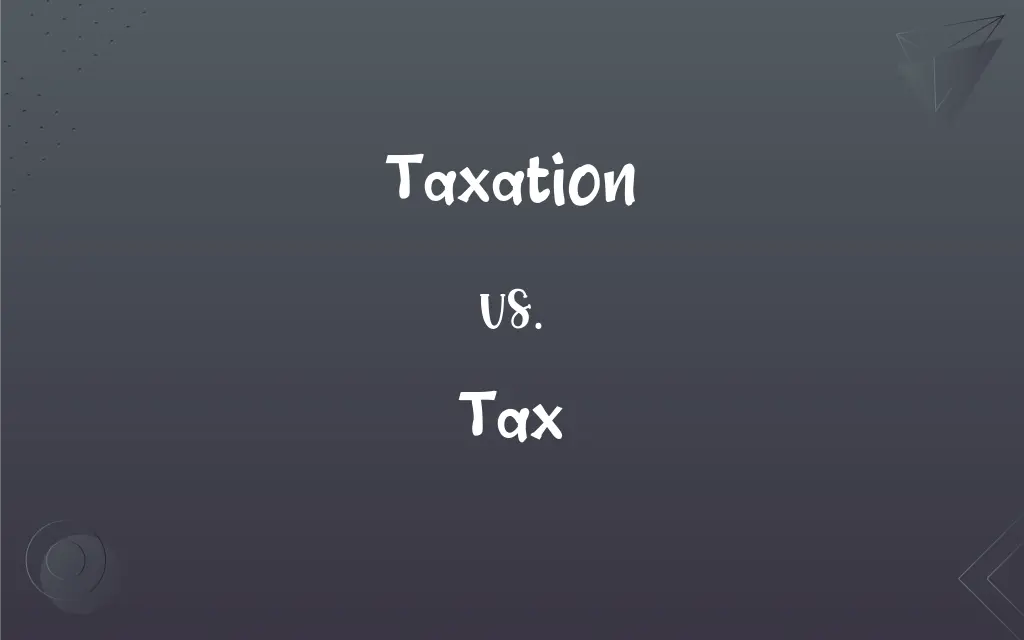Taxation vs. Tax: What's the Difference?
Edited by Harlon Moss || By Janet White || Updated on November 13, 2023
Taxation is the process or system of imposing taxes, while a tax is a specific charge levied by a government on goods, income, or activities.

Key Differences
Taxation refers to the overall system or practice through which governments impose financial charges on citizens or entities. Tax, on the other hand, is an individual levy, a specific amount charged by the government on income, property, or goods.
The concept of taxation encompasses various types of taxes, including income, sales, and property taxes. In contrast, the term tax typically refers to a single specific charge within this system, such as an income tax or a sales tax.
Taxation is a broader term that covers the policies, rules, and regulations governing how taxes are collected and managed. A tax is a component of this broader system, representing an individual obligation to pay a particular charge.
Taxation as a process includes the determination of tax rates and the collection mechanisms. A tax, however, refers to the actual amount that is due from an individual or entity under the rules of the taxation system.
Taxation is often discussed in terms of its impact on the economy or society, such as progressive or regressive taxation. A tax, in its individual capacity, is discussed in terms of its rate or the specific base it is levied upon, like property or income.
ADVERTISEMENT
Comparison Chart
Definition
System or process of imposing taxes
Specific financial charge imposed by government
Scope
Broad, encompassing various types of taxes
Specific, refers to an individual levy
Function
Involves setting policies and rules for taxation
A component of taxation, adhering to set policies
Example
Income tax system as a whole
A particular income tax rate
Discussion Context
Often about impacts and structures
Typically about rates and specific obligations
ADVERTISEMENT
Taxation and Tax Definitions
Taxation
Taxation is the act of levying taxes by a government authority.
The taxation of income is critical for government revenue.
Tax
A tax is a levy collected by the state on income or activities.
Sales tax is added to the price of purchased goods.
Taxation
Taxation is the imposition of compulsory levies on individuals or entities.
The taxation of luxury goods is higher than essential items.
Tax
A tax is a government-imposed charge on property or transactions.
Property tax is calculated based on the value of owned land.
Taxation
Taxation refers to the system through which public funds are raised.
Taxation in many countries is progressive, depending on income levels.
Tax
A tax is a specific contribution required for state revenue.
Income tax is deducted directly from employees' salaries.
Taxation
Taxation is the practice of collecting taxes to fund public services.
Taxation is essential for maintaining public infrastructure.
Tax
A tax is a compulsory financial charge imposed by a government.
The new carbon tax aims to reduce greenhouse gas emissions.
Taxation
Taxation encompasses the governmental policies for tax collection.
The new taxation policy aims to close loopholes in corporate tax.
Tax
A tax is a mandatory payment to the government without direct benefit.
Excise tax is imposed on specific goods like alcohol and tobacco.
Taxation
The act or practice of imposing taxes.
Tax
A contribution for the support of a government required of persons, groups, or businesses within the domain of that government.
Taxation
The fact of being taxed.
Tax
A fee or dues levied on the members of an organization to meet its expenses.
Taxation
An assessed amount of tax.
Tax
A burdensome or excessive demand; a strain.
Taxation
Revenue gained from taxes.
Taxation
The act of imposing taxes and the fact of being taxed.
Taxation
A particular system of taxing people or companies
Taxation
The revenue gained from taxes
Taxation
The act of laying a tax, or of imposing taxes, as on the subjects of a state, by government, or on the members of a corporation or company, by the proper authority; the raising of revenue; also, a system of raising revenue.
Taxation
The act of taxing, or assessing a bill of cost.
Taxation
Tax; sum imposed.
Taxation
Charge; accusation.
Taxation
Charge against a citizen's person or property or activity for the support of government
Taxation
Government income due to taxation
Taxation
The imposition of taxes; the practice of the government in levying taxes on the subjects of a state
FAQs
What is a tax?
A tax is a specific financial charge levied by a government on income, goods, or activities.
What is taxation?
Taxation is the system or process by which governments impose financial charges on citizens or entities.
How does taxation affect the economy?
Taxation can influence economic behavior, redistribute resources, and fund public services.
What are the types of taxes?
Types of taxes include income, sales, property, and excise taxes.
Who is responsible for taxation policy?
Government bodies and legislative authorities are responsible for setting taxation policies.
What is tax avoidance?
Tax avoidance involves legally minimizing tax liability through careful financial planning.
What is a tax return?
A tax return is a form filed with a tax authority reporting income, expenses, and other tax information.
Can tax laws change frequently?
Yes, tax laws can change based on new legislation or policy reforms.
Who must file a tax return?
This varies by jurisdiction, but generally, individuals and entities with taxable income must file a tax return.
How is tax revenue used?
Tax revenue is used to fund public services, infrastructure, and government functions.
What is progressive taxation?
Progressive taxation is a system where tax rates increase with higher income levels.
What is a tax exemption?
A tax exemption is a monetary exclusion that reduces taxable income.
Are taxes the same in every country?
No, tax systems and rates vary significantly between countries.
Can taxes be deducted from wages?
Yes, in many countries, taxes are deducted directly from wages (withholding tax).
What are indirect taxes?
Indirect taxes are levied on goods and services rather than on income or profits.
Can charitable donations reduce tax liability?
Yes, in many jurisdictions, charitable donations are tax-deductible.
What is a regressive tax?
A regressive tax takes a larger percentage from low-income earners than from high-income earners.
Is tax evasion illegal?
Yes, tax evasion, or the deliberate non-payment of taxes, is illegal.
What happens if you don't pay taxes?
Non-payment of taxes can result in penalties, fines, or legal action.
What is a tax credit?
A tax credit is a sum deducted from the total amount a taxpayer owes to the government.
About Author
Written by
Janet WhiteJanet White has been an esteemed writer and blogger for Difference Wiki. Holding a Master's degree in Science and Medical Journalism from the prestigious Boston University, she has consistently demonstrated her expertise and passion for her field. When she's not immersed in her work, Janet relishes her time exercising, delving into a good book, and cherishing moments with friends and family.
Edited by
Harlon MossHarlon is a seasoned quality moderator and accomplished content writer for Difference Wiki. An alumnus of the prestigious University of California, he earned his degree in Computer Science. Leveraging his academic background, Harlon brings a meticulous and informed perspective to his work, ensuring content accuracy and excellence.































































